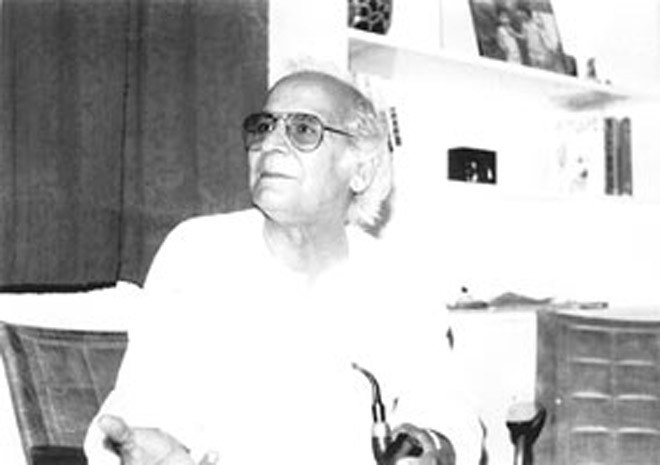
A staunch advocate of the growth of mother tongues

Does association with some literary movement inspired by some explicit ideology help flourish the talent of a writer or just utilise and consume it in explaining ideology? How can a writer guard his or her originality while staying faithful to the ideological framework of the movement?
We can’t resist these questions while setting out for evaluation of Sibte Hasan who joined Progressive Writers’ Movement in its initial phase and stuck to its conceptual framework throughout his life. With even a cursory look on his books, articles and interviews, one comes to believe that Marxian ideology didn’t hamper or consume his intellectual augmentation.
Hasan managed to keep broadening his vision of the dynamics of social, cultural, political and literary structures of society without endangering the socialist ideology. He was an unmatched intellectual and enlightened soul who believed in giving away all what he found best in his intellect as well as in history and literature.
He never restricted his intellectual efforts to just explaining Marxian ideology in an oversimplified manner. He avoided exhausting his mental energies in rejecting all opposing theories of his time. Though he raised and tackled theoretical issues related to socialism in his writings to some extent, his main concern was with real issues that he perceived as influencing the economic, social, political and intellectual life of the people.
Though he wrote mainly on the past, present and possible future of Asia, East and Pakistan in wider cultural and historical perspective, he didn’t ignore the politics of language that has continued dividing our society.
Read also: Editorial
Soon after independence, the issue of language emerged as one of the major and most sensitive issues of Pakistan. A new kind of hatred, loathing and ‘linguistic sectarianism’ was experienced by both hemispheres of Pakistan. Struggle for independence revolved mostly around ‘one nation, one religion, one language’ formula.
Native rulers couldn’t perceive or didn’t deem it necessary to perceive how a construct of colonial period can turn a newborn country into a place of hate and wrangle. A swift process of decolonisation was necessary to have started off soon after independence in order to achieve complete and unequivocal emancipation.
Realising the sensitivity and political repercussions of the language issue in quite early days, Sibte Hasan wrote articles in newspapers and journals. First he thought it necessary to illustrate unequivocally the particular significance of the discipline of linguistics.
Quoting Max Muller’s line from his lecture delivered in 1889 at Oxford that reads ‘’one who doesn’t know what language is and how it proceeds can’t be described as educated," Sibte Hasan deplores the lethargic attitude of Pakistani rulers, intellectuals, writers and academia towards linguistics.
His crystal clear vision of the importance of language in solving real problems should be appreciated. He said in 1955 that "I think no other country goes with Pakistan as far as the dire need for linguistics is concerned’’ because the language issue in Pakistan is the most complicated one.
Sibte Hasan is of the view that language has no religion but paradoxically, religious emotions are attached with languages in Pakistan, particularly with Urdu. He cites the example of a Karachi-based Gujarati-speaking literati who in 1970 attended a function about Josh where an Urdu writer said that Urdu is part of faith. If you don’t prefer Urdu over all other languages of Pakistan then your faith is suspicious and doubtful. Sibte Hasan termed these people Urdu Kay Nadan Dost (unwise friends of Urdu). Instead of serving it, they are causing damage to Urdu.
Fascinatingly, Sibte Hasan’s mother tongue was Urdu but he was a staunch advocate of the growth and development of mother tongues of all Pakistanis. He believed that one who loves his or her mother tongue is justifiably expected to love and respect his or her fellow people’s mother tongues.
He disapproves powerfully the myths constructed in and around the colonial period and continued in the post-colonial era about Bengali, Pashto and Punjabi as languages of Hindus, Jews and the illiterate respectively. He notes down that these myths have given rise to revulsion for the speakers of these languages.
He particularly refers to the case of Bengali which had to suffer, first by the hands of politicians and others of the then West Pakistan and then it suffered due to a notorious ‘one nation, one language’ formula.
Sibte Hasan not only entitles all Pakistan languages as national languages but he was of the view that clash between these national languages is paving the way for unprecedented hegemonic role of the English language. Following the well-known policy of the English -- ‘divide and rule’ -- English-speaking bureaucracy is creating divisions among speakers and activists of national languages. They fight with each other and fail in finding a common ground to fight against the dominative role of English language which is a most auspicious colonial legacy.
To sum up, in the words of Sibte Hasan, I would like to add that if we are to prosper as a nation we should give equal rights to all Pakistani languages, including Urdu. These ideas propounded by Sibte Hasan are as relevant today as they were in the 1950s when he pointed out these issues.